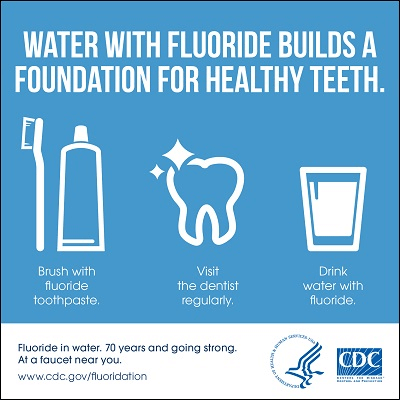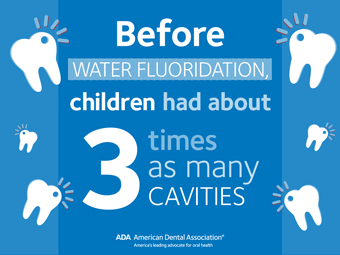
Pediatric oral hygiene is the foundation for ensuring a healthy transition for a child into their adult years. As a parent of a two year old boy, I can say from personal experience that taking care of his teeth is hard but so is nearly everything you do with a child so I would not expect it would be any different. Setting a good example by brushing and flossing your children’s teeth is important to help establish a good routine that they will continue on their own into their adult years. Oral health impacts children just as much, if not more, than their adult counterparts.
Parents often disregard cavities in their children’s teeth because they feel “it’s a baby tooth” and they feel that it will be replaced in a couple of years. However, primary teeth serve a larger purpose by acting as placeholders for permanent teeth. Without them, adult teeth very likely would not have enough room to erupt into their correct locations. Additionally, baby teeth can also become abscessed, much like adult teeth. In fact, tooth pain is one of the leading causes for children to miss school and should not be taken lightly.
Here are a few suggestions for any parent looking to implement a healthy routine with their child:
– For younger children, if they sleep with a bottle, avoid anything in their bottle at night except water.
– Once their teeth start erupting, set a good example by brushing twice a day and flossing once a day. Using a smear of fluoride toothpaste before your child can spit it all out will help fight tooth decay. Once they can spit, a pea-sized amount of toothpaste starts to make more sense.
– Getting kids in to see the dentist around one year of age for a “happy visit” is a great idea. We can look at their teeth (if they will let us), let them ride in the chair and check out the gadgets we use for cleanings, like air and water hoses. It sets the foundation to help kids feel more comfortable visiting a dental office and getting to know their hygienist and dentist.
– I hear from parents that have had bad dental experiences as a child that they are afraid of passing on their dental phobia to their kids. This is a very real concern. I recommend avoiding phrases like “it’s not going to hurt” when you talk to your kids about dental work and cleanings. Children hear what you are not saying and can read between the lines about our own experiences.
– Get a cheap electric toothbrush! Oral-B makes all sorts of character electric toothbrushes. It makes brushing their teeth fun and engaging.
– You may find that boys need help longer with brushing their teeth. Let them help with one hand on the brush but you should be doing the work until you are confident that they can do it themselves. Let us evaluate if necessary!
– Getting children on a fluoride supplement early is important in non-fluoridated communities like in Arlington and Stanwood-Camano areas. Fluoride becomes incorporated into their adult teeth and lowers their cavity risk into their adult years by 300%!
If you have any questions, we can help. Please call us at 360-629-7229 if you have any questions or would like to schedule a pediatric visit for your child.

 I recently had a discussion with a friend of mine as I gave my son his daily fluoride drops. After I was done, my friend looked at me with a puzzled expression and asked me why I would give my son fluoride because she had heard that fluoride is toxic. As a dentist, I hear this view fairly often and it’s frustrating because I immediately want to start presenting all the research touting the major benefits of fluoride supplements in children without coming off as overbearing. In my friends’ case, I very confidently answered her that I was doing my son a favor by giving him fluoride supplements to reduce his future risk for tooth decay because our local drinking water is not fluoridated. Because this is such a common concern, I’d like to take a moment to further explain myself and offer a few points for parents of young children to consider.
I recently had a discussion with a friend of mine as I gave my son his daily fluoride drops. After I was done, my friend looked at me with a puzzled expression and asked me why I would give my son fluoride because she had heard that fluoride is toxic. As a dentist, I hear this view fairly often and it’s frustrating because I immediately want to start presenting all the research touting the major benefits of fluoride supplements in children without coming off as overbearing. In my friends’ case, I very confidently answered her that I was doing my son a favor by giving him fluoride supplements to reduce his future risk for tooth decay because our local drinking water is not fluoridated. Because this is such a common concern, I’d like to take a moment to further explain myself and offer a few points for parents of young children to consider. On the other hand, dental decay is endemic and is a very serious health concern that many children and adults face. Dental decay can lead to pain and premature tooth loss and can be debilitating to many children and adults alike. Yet fluoride consumed as a child brings down that persons’ lifelong risk for dental decay in their permanent teeth. Simply put, a child who orally consumes fluoride at the recommended levels, results in fluoride integrating into that child’s adult teeth as they develop which helps reduce future risk for tooth decay – certainly a major benefit to that child as they age.
On the other hand, dental decay is endemic and is a very serious health concern that many children and adults face. Dental decay can lead to pain and premature tooth loss and can be debilitating to many children and adults alike. Yet fluoride consumed as a child brings down that persons’ lifelong risk for dental decay in their permanent teeth. Simply put, a child who orally consumes fluoride at the recommended levels, results in fluoride integrating into that child’s adult teeth as they develop which helps reduce future risk for tooth decay – certainly a major benefit to that child as they age.